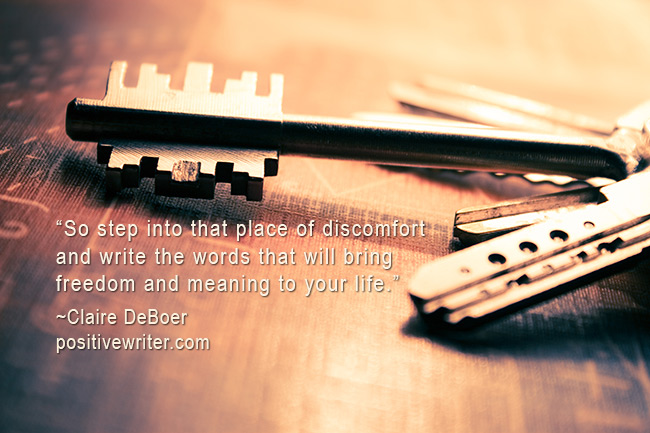Note: This is a guest post by Claire De Boer, she is a certified Journal Instructor and teaches online workshops at www.thegiftofwriting.com. Download her free eBook, “Soul Writing,” and follow her on Twitter @ClaireJDeBoer. Claire’s passion is to help writers come to a new place of awareness and personal growth through writing their own stories.
These days everyone’s talking about writing your story. Not just any old story, but the story of your life, the road map that got you to where you are today. For most of us that’s a pretty daunting thought. I mean, why would anyone be interested in hearing our story anyway?

Life changing
Well, I’m a big proponent of this personal story writing business, and I’ll tell you why: it changed my life.
I used to write fiction. I loved hiding behind the facades of the characters I created. But then my work led me into writing for a magazine where people share their personal stories, and I found myself on unfamiliar territory.
I actually had no interest in sharing my story—I wasn’t a fiction writer for nothing. I thought my past was empty and depressing. But given my role as both a writer and editor for this magazine, I really didn’t have much choice.
Resistance
So I sat down at my computer and with absolute resistance I began to write the truth of my life. I was full of fear—afraid to reveal my authentic self and the vulnerability that came with doing it. I was also fearful that no one would give a hoot about my story.
My resistance to the process resulted in quite the crappy effort. Apparently my chief editor thought so too. She sent the article back to me with these words: “go deeper.” Not quite the response I was looking for.
So I went back to my computer, stared at a blank page for a while and began to write. But this time I didn’t write from a place of resistance, I wrote from the heart.
The result was tears, not just on my part, but my editor’s too.
But more important than the tears was the overwhelming sense of release. In reconnecting with my story I somehow gave it a voice. I gave myself a voice that needed to be heard.
I have continued to write my story and to pursue the practice of helping others do the same. Not only do I believe that telling our stories is an important way to get to know ourselves and find healing, I also believe it’s a way to connect with others on a deeply authentic level.
You need to tell your story and share it with the world!
Declare it: click here to tweet this.
Where do we begin?
Writing our personal stories is the most vulnerable kind of writing we can do. We fear being laughed at, rejected, or that our words will be met with silence. And in turn, we ourselves remain silent.
Through the process I have found six important steps to be helpful:
1. Tap into your emotions.
Your story won’t resonate with others if it is void of emotion, as I discovered when writing that first draft of my own story. So take out your paper and pen and write down some key feelings that you associate with your life so far. Then write something about each feeling and the story behind it.
2. List the turning points.
People often make the mistake of starting with their earliest childhood memory and moving through their story chronologically. But rather than starting at the beginning, it’s more helpful to make a list of your life’s key turning points—those times when you were standing at a crossroads and the direction you chose marked a significant change in your life.
3. Write everything down.
It might not seem like much at the time but it’s amazing how one memory leads to another and allows you to go deeper into your story. As with all writing, you may not use many of the scenes you write, but that doesn’t mean they don’t have a purpose.
4. Use the senses.
The one thing that will help you explore long forgotten memories is to use your senses. As you recall events, try to remember the smells, tastes and sounds that accompany them. Not only will this help you remember details, it will also enrich your writing.
5. Find the theme.
Once you have compiled a large number of significant scenes, it’s likely you will begin to see a theme emerging. Your theme is the central question driving your story. The ability to carry this theme through the sequence of events you have recorded is what will turn your individual scenes into one story. It may be that you discover more than one theme. That’s okay; it’s likely there will be one that stands apart from the others.
6. Tell a story.
You have your theme and a multitude of scenes; you’ve gone through a box of tissues in the process of exploring your emotions, but have you told a story? As you begin to work on pulling it all together, focus on the reader. What about your story will connect with him? The best stories are ultimately those that connect with the reader the most.
This process of telling your story is, I believe, one of the most rewarding and clarifying things you can do for yourself, and for others.
So step into that place of discomfort and write the words that will bring freedom and meaning to your life. Is it not time?
Are you writing your story? Have you found the experience to be healing? Share your journey and process in the comments.
